Welcome to Ceramic Review
Ceramic Review is the magazine for contemporary and historical ceramics, ceramic art and pottery.
Ceramic Review Issue 334
July/August 2025
Ceramic Review is the magazine for contemporary and historical ceramics, ceramic art and pottery.
July/August 2025
Ceramic pines made by artisans in Mexico have become a passion for the interior design duo behind Objekti. Jane Audas discovers more
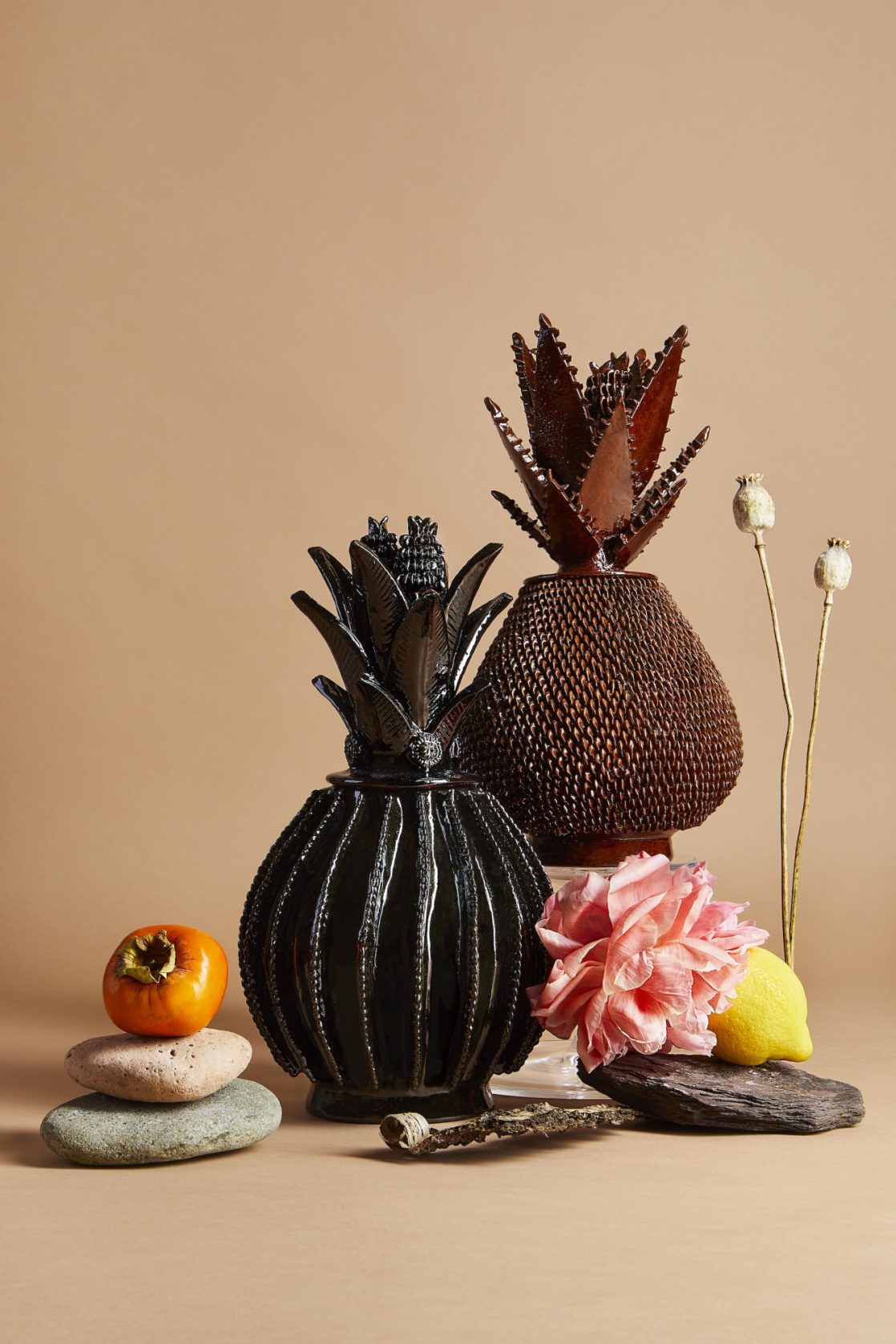
Black Pearl and Chocolate
One of the lovely things about the history of ceramics is how it represents hands-on past cultures. Indigenous ceramics embody the essence of making, using and decoration in different countries, often through many generations or even centuries.
In Mexican ceramics, the pinecone is writ large. Ancient statues of the Aztec goddess of agriculture and fertility: Chicomecōātl (Seven Snakes), show her holding corn or, as some researchers tell it, pinecones. Today the pine is a symbol of goodwill in Mexican culture and it is pinecones that form the inspiration for the ceramic ‘pines’ sold by the British company Objekti. The company was founded in 2021 by step-siblings Miriam and Benjamin Frowein, who both work in interior design. Benjamin is CEO of Schumacher in Europe and the Middle East, while Miriam runs her own design business: Miriam Frowein Interiors, based in London.
Objekti’s pines are part of a tradition of ‘piñas artesanales’, Mexican folk ceramics. Miriam and Benjamin first came across these showstopping ceramics on a trip to Mexico before the coronavirus lockdown. They saw the work of the Hernández Carlos family in a museum and were hooked. As Miriam says: ‘Working in interior design means we are always looking for pieces that are one-of- a-kind, where you see the craftsmanship and uniqueness.
The way the colours were created, the details and the size of them, really talked to us. We wanted to investigate importing them, but lockdown prevented that. Once we were able to travel again, Benjamin visited the artisans and we started working with them.’
The whole process has taken longer than they both anticipated, not least because they also have their day jobs. The logistics of time, distance and working with artisans has made Objekti more of a labour of love than anything else. At least so far.
FAMILY HERITAGE
In North Mexico, Pedro Hernández Carlos and his family have been making ceramic pines, to local acclaim, for decades. From grandfather to grandson, it is a family affair says Benjamin. Each vase is made in stages and has two main pieces: the vessel and the lid. The artisans create the vessels first, sometimes from coiled, sometimes moulded clay. They use a fine red local clay, similar to terracotta. They fire as many vessels as possible at one time, in handbuilt kilns, dug into the ground and wood-fired from below. This is no mean feat as the pine vessels range in size from 30cm to just over a metre tall. A range of family members work on different parts of the pines on different days, decoration happens on one day, glazing on another.
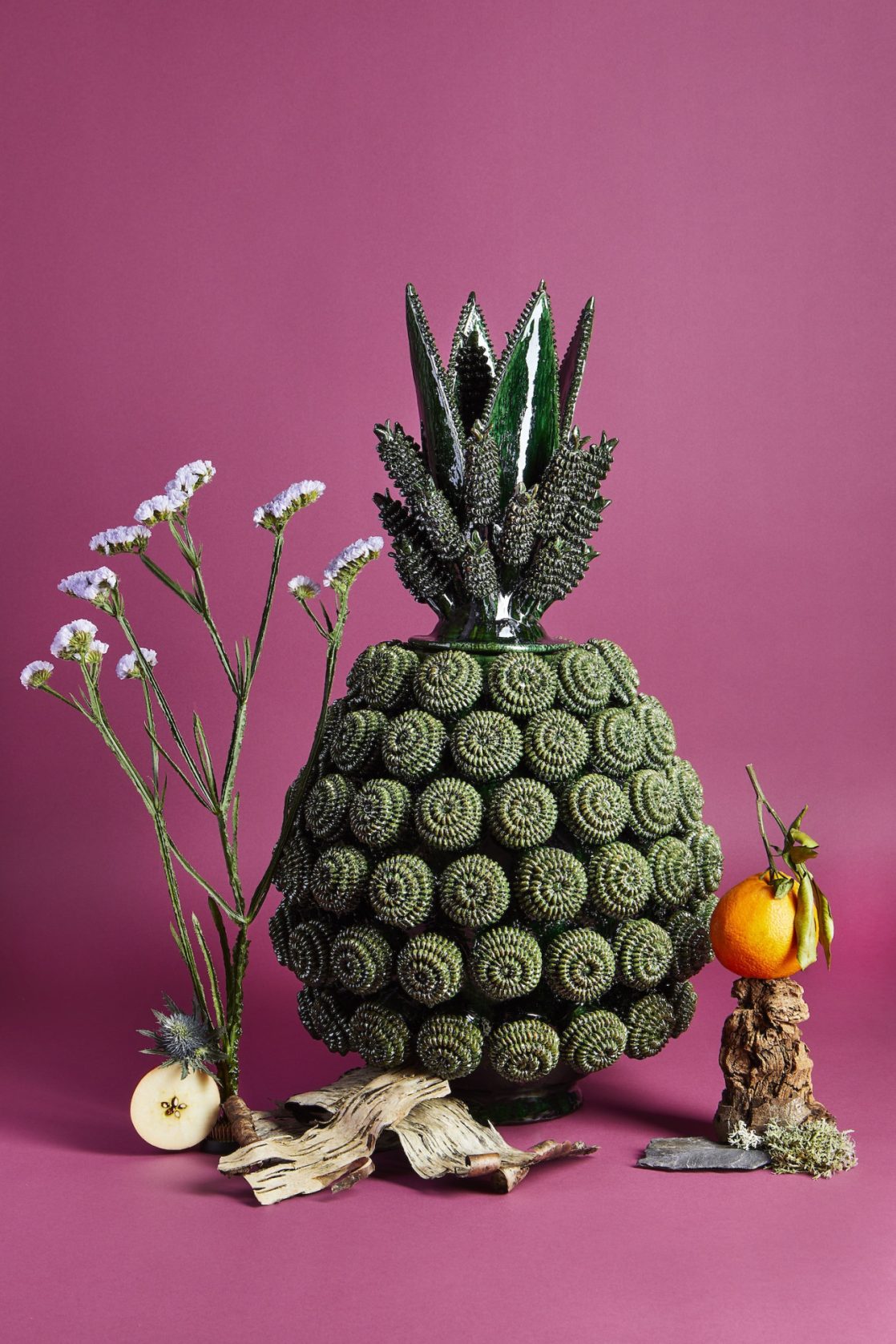
Green Sprouts
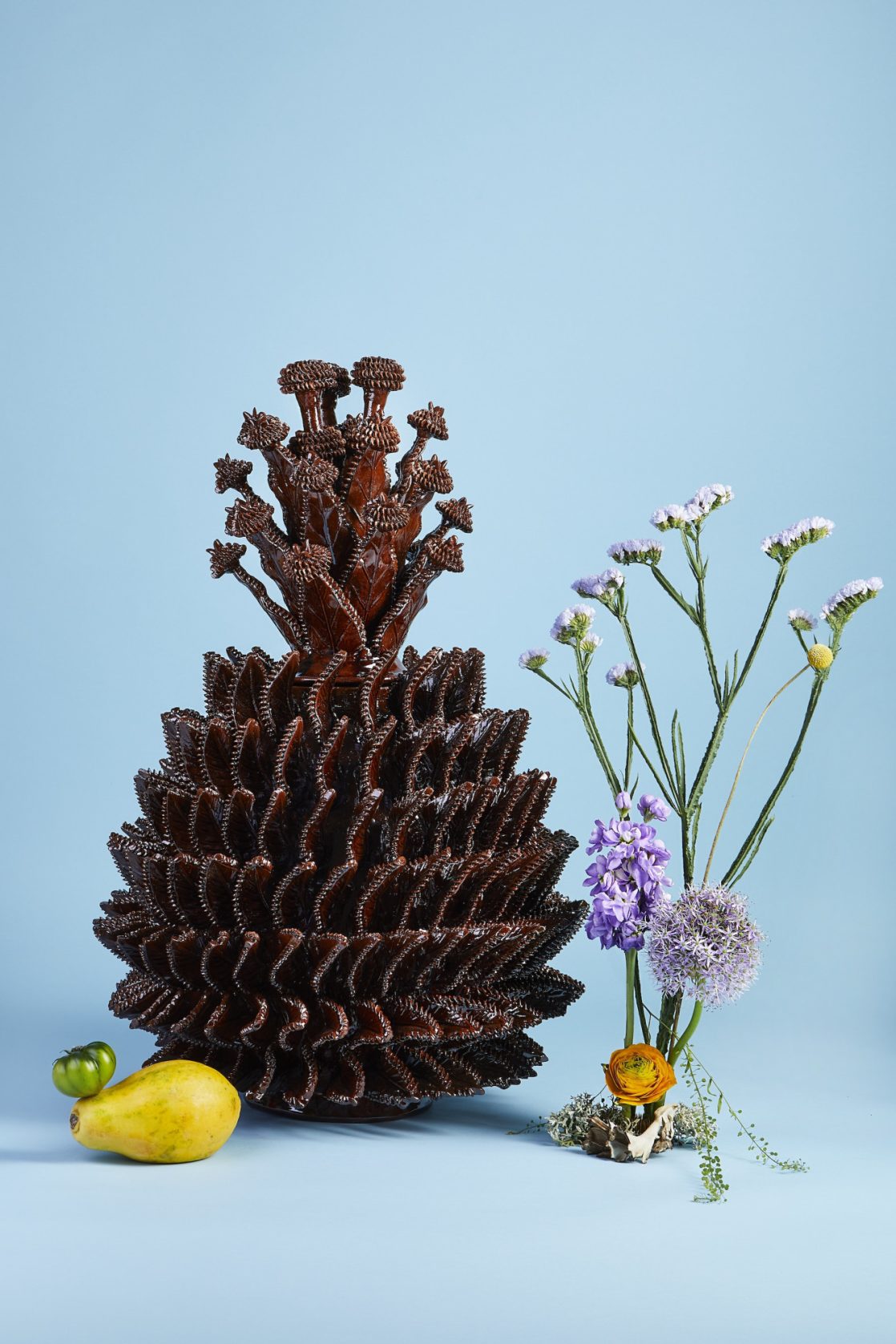
Indian Summer
Miriam and Benjamin are taking things slowly building up Objekti, partly because it can take up to eight weeks to make one of the larger pines. Transporting the complicated, fragile pots to Europe has been a job in itself. At the beginning, breakages during transport almost made them want to give up on the whole project. Now, a year or so down the line, they are conscious of the responsibility of working with artisans who are, perhaps, not as capitalistic as they could be.
Objekti do not press the artisans to cut corners in order to make profit margins better. On the contrary says Benjamin, they are trying to help the family protect their artistic legacy. In terms of adapting the designs, Miriam says they have dabbled with making changes, but sometimes things got lost in translation. In the end, says Benjamin, they want to give the Mexican artisans as much room as they need to do what they do, as well as they can. ‘We try to encourage them to upgrade, not downgrade, their work,’ he explains. ‘It has been a wonderful experience working with them because they are artists. What is better than to be able to say to them: “create the most beautiful thing that you can”.’
The whole artisanal making process circumnavigates the cult of named designer/artist that we value so much in European art markets. As an art collector herself, Miriam is used to knowing the minutiae of the career and provenance of the artists she collects, but working with the Hernández Carlos family is a different process, so sensitivity has been important.
Benjamin says they have plans to extend the Objekti website to include a section with more details about the artisans. ‘But they (the family) haven’t really decided whether they want this or not.’ Objekti are currently limited to getting around 30-40 pieces a year, and so have to cut their business to the shape of their supply. But they also have plans to extend the Objekti product offer with furniture, working with other artisans and designers.
CERAMIC STORY
Objekti’s pines were shown at Collect this year, to great success. They looked delicious in a brown ceramic cave of a room. People were fascinated and lingered to hear the story. ‘We were surprised how much time people spent with us, listening to the story of these ceramics,’ explains Benjamin. The feedback was also, unsurprisingly, that customers are interested in knowing more about who made them. The Collect crowd immediately understood the lure of the Objekti pines, which had been an initial worry, says Miriam. ‘People are open to bringing these pieces into contemporary European interiors. We are constantly in awe of how versatile they are. We both understand what fits into which area of an interior, but true craftsmanship, something really unique, will fit in anywhere because it adds to your room. And I think that is what has made Objekti successful.’
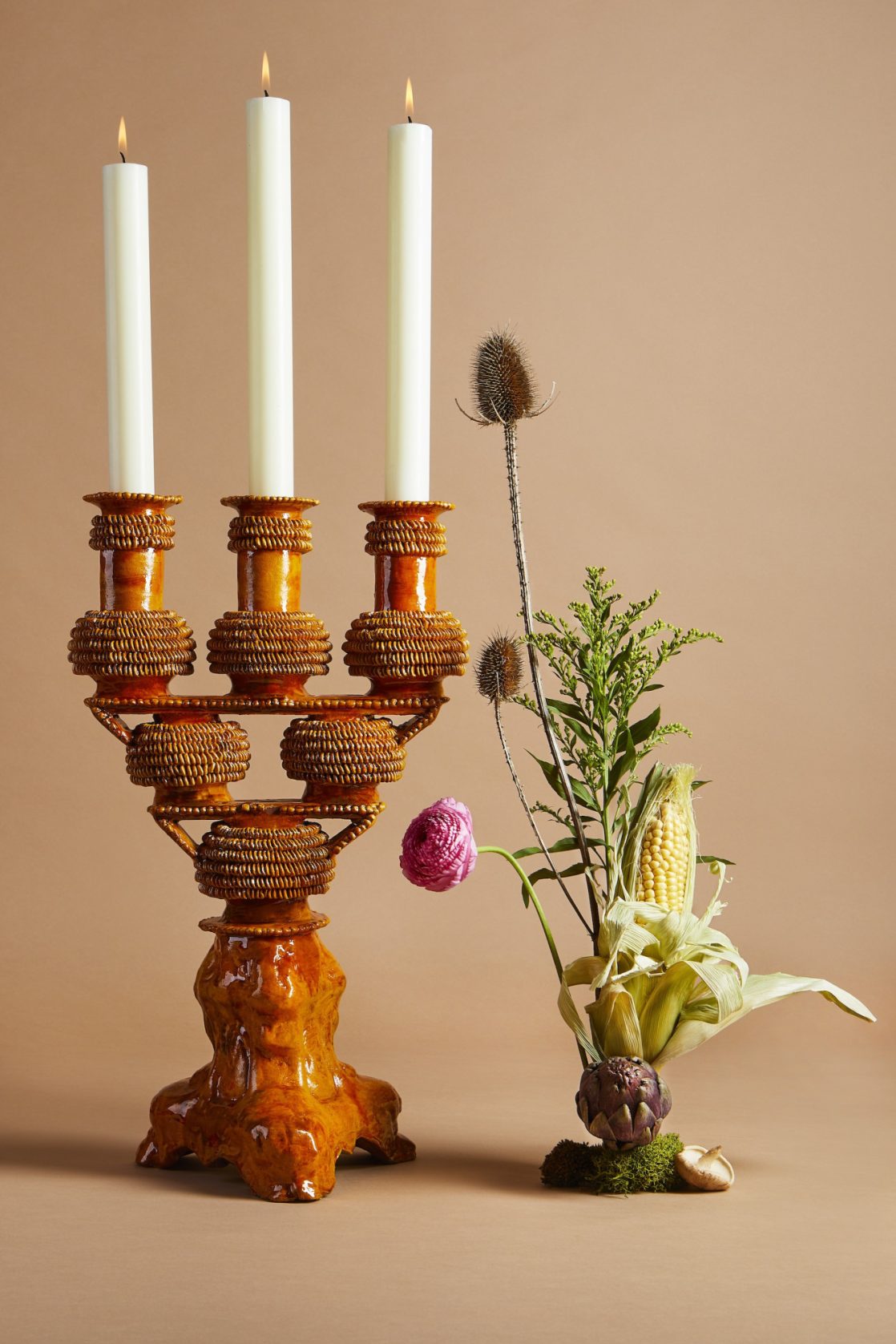
Spice Candelabra
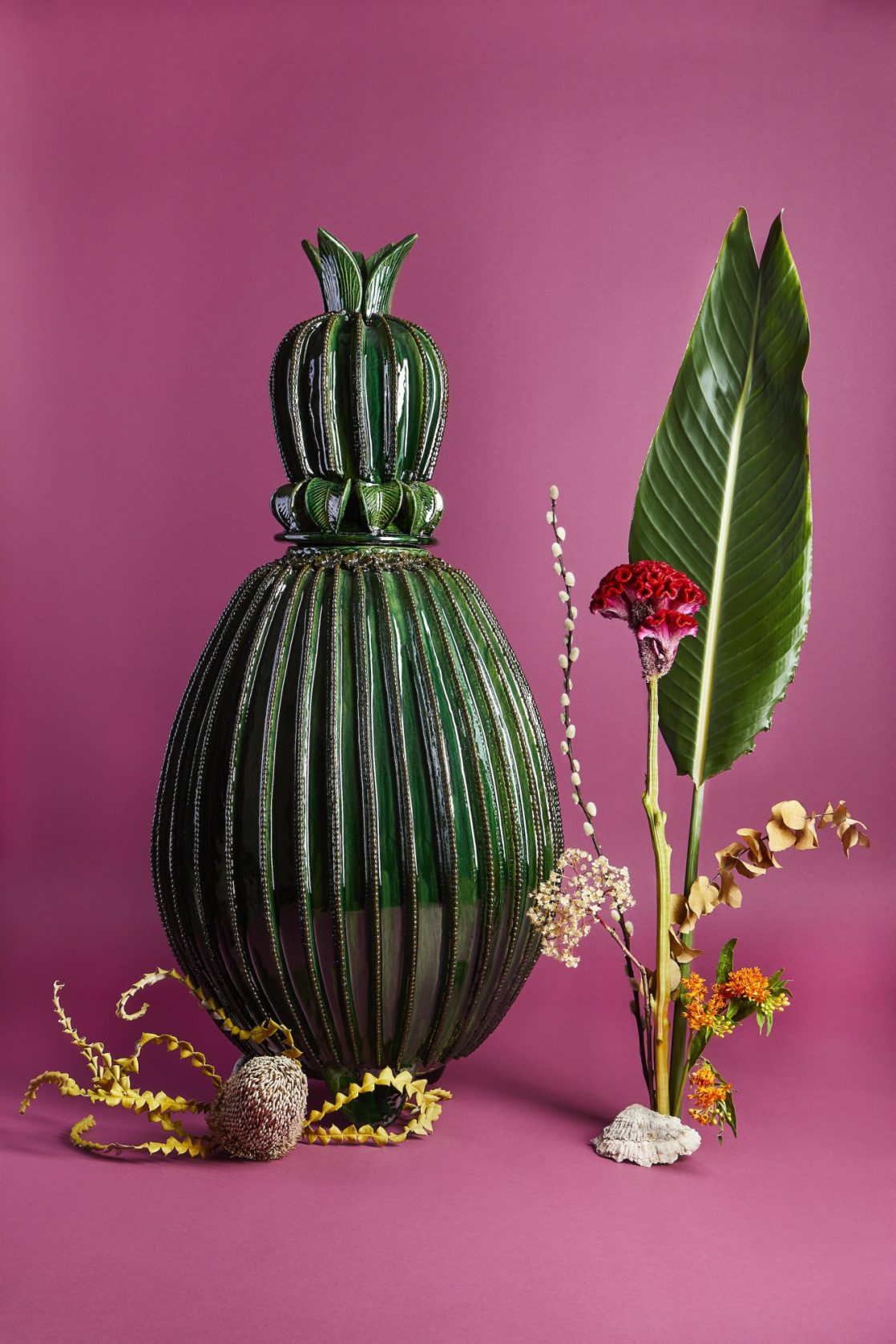
Green Cactus
With their trained design eyes, Miriam and Benjamin recognised how these ceramic pines – beautifully crafted, excitingly coloured, textured and tactile – could become part of the mix within contemporary interiors. And so far, for Objekti, the reception is positive and their remit to treasure collaboration, craftsmanship and beauty, is right on track. Running Objekti is currently their night and weekend shift, says Benjamin. ‘It really is a passion. I wish I could call this a job or a side business – maybe one day.’
Miriam is particularly enjoying introducing her interior design clients to Objekti’s pines. ‘When you touch these pieces and live with them, you feel the character behind them. You feel that many hands have touched them, for many hours, for them to become what they are. I live with art a lot and I recommend art to my clients and this (Objekti’s ceramics) is art. It is artisanship at the highest level.’
For more details visit objekti.co.uk
Images: courtesy of Objekti